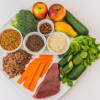
Dietary proteins play an indispensable role in promoting optimal health by supporting muscles, boosting immunity, aiding weight management, and fostering overall wellness. This article provides a comprehensive guide on implementing effective strategies to achieve the desired protein quota in your daily diet. Get ready to set your path towards a healthy protein-packed lifestyle.
Understanding the Importance of Protein
Protein is an essential macronutrient that fuels many biological processes. It serves as the building block of our body tissues such as muscles, skin, hair, and nails. Protein intake is critical to our body's growth, development, and repair. It helps maintain lean muscle mass and curbs hunger by making us feel fuller, supporting weight management. Moreover, proteins form antibodies, enzymes, and hormones, that are crucial to our body's functioning.
Know Your Protein Requirement
The Recommended Dietary Allowance (RDA) for protein depends on age, gender, and level of physical activity. On average, adult males need 56 grams, while women require around 46 grams per day. Endurance athletes or those aiming to gain muscle mass might need more protein. Consult a healthcare professional or a dietitian to understand your specific protein requirements.
Protein-packed animal-based Foods
Animal sources are complete proteins, meaning they contain all the essential amino acids your body needs. Lean meats like chicken, turkey, and fish are high in protein and low in unhealthy fats. Eggs are also a rich source of protein and other essential nutrients. Dairy products like milk, cheese, and Greek yogurt offer a well-rounded nutrient profile along with significant protein content.
Plant-Based Protein Sources
For vegetarians and vegans, ample protein can be obtained from plant-based sources without having to rely on animal products. Legumes such as lentils, chickpeas, and black beans, and whole grains like quinoa and brown rice, are packed with protein. Nuts and seeds, including almonds, chia seeds, and flaxseeds provide a substantial protein punch, while soy products, like tofu and tempeh, are excellent protein-rich options.
Include Protein at Every Meal
To meet your daily protein needs, it's best to distribute protein intake across all meals throughout the day. Sneak more protein into your meals by adding Greek yogurt to your breakfast, pairing your snacks with nuts and seeds, choosing leaner cuts of meat for lunch, and incorporating beans, lentils, or quinoa in your dinner.
Opt for Protein-enriched Foods
Several foods now come in protein-enriched versions, such as protein bread, pasta, and cereals. These are a convenient way to boost your protein intake. However, remember to check for added sugars and artificial additives in these products.
Use Protein Supplements Wisely
Protein supplements, like whey protein and plant-based protein powders, can be a helpful tool to meet your daily protein needs, especially for those with higher protein demands or restrictions in consuming certain foods. However, these should be used as a supplement, not a substitute for a balanced diet. Always choose a high-quality product with minimal artificial additives and consult a healthcare professional before incorporating supplements in your diet plan.
















